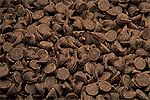 | Chocolate: Sweet News |
 | Chocolate: Sweet News |
| By Ellen Kuwana Neuroscience for Kids Staff Writer December 22, 2000
The Complexities of ChocolateDuring the holidays, people eat lots of sweets. Chocolate is one sweet that is popular any time of the year. Chocolate is not only a delicious treat, it is a very complex food: it contains at least 380 chemicals that contribute to its taste.News to Chew On Tomas Herraiz, a Spanish chemist, has isolated one more chemical
from chocolate. Dr. Herraiz has found alkaloids called
tetrahydro-beta-carbolines in chocolate and cocoa. The newly
discovered compound, tetrahydro-beta-carboline, and the family of
chemicals it belongs to, beta-carboline alkaloids, affect the central
nervous system in several ways:
Tomas Herraiz, a Spanish chemist, has isolated one more chemical
from chocolate. Dr. Herraiz has found alkaloids called
tetrahydro-beta-carbolines in chocolate and cocoa. The newly
discovered compound, tetrahydro-beta-carboline, and the family of
chemicals it belongs to, beta-carboline alkaloids, affect the central
nervous system in several ways:
Serotonin and dopamine have been shown to influence mood, food intake and compulsive behaviors. Because alkaloids affect these neurotransmitters they may also affect these behaviors. Many people say that chocolate makes them feel happy and relaxed. Perhaps you have felt these feelings after eating chocolate. Some people even "crave" chocolate, hence the sort-of-serious name "chocoholic," for someone who is "addicted" to chocolate. In fact, the alkaloids tetrahydro-beta-carbolines have been implicated in one addictive behavior: alcoholism.
Do Alkaloids Cause Chocolate Craving?Well, it's not that simple. Chocolate does not contain a large amount of alkaloids and darker chocolate has higher quantities of alkaloids than lighter chocolate. However, alkaloids are found in foods that are not addictive. Also, there are many chemicals in chocolate, and tetrahydro-beta-carboline is just one of them -- a newly discovered one. So, another piece of the puzzle has been found, one that scientists hope will add to the big picture of why chocolate is so appealing.
|
|
References:
|
| BACK TO: | Neuroscience In The News | Table of Contents |
![[email]](./gif/menue.gif) Send E-mail | ![[survey]](./gif/menusur.gif) Fill out survey | ![[newsletter]](./gif/menunew.gif) Get Newsletter | ![[search]](./gif/menusea.gif) Search Pages |